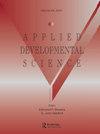冲动控制缓和了司法系统涉事青年中物质使用与物质使用相关后果之间的联系
IF 1.5
3区 心理学
Q3 PSYCHOLOGY, DEVELOPMENTAL
引用次数: 0
摘要
这项研究调查了青少年经历的物质使用后果的程度是否与他们的冲动控制有关。纵向数据来自十字路口研究中涉及司法系统的1216名男性青少年(46%拉丁裔,37%黑人,15%白人,2%自认为是其他种族)。结果表明,冲动控制能力较低的青少年比冲动控制能力较高的青少年更有可能经历与药物使用相关的负面社会、学校/工作、犯罪、法律和身体后果——即使是在使用频率相同的青少年之间也是如此。目前的结果表明,除了解决物质使用本身,治疗和干预工作也可以针对冲动控制问题,以减少青少年使用物质的后果程度。本文章由计算机程序翻译,如有差异,请以英文原文为准。
Impulse control moderates the association between substance use and substance use-related consequences among justice-system-involved youth
This study examined whether the extent to which youth experience consequences resulting from substance use was related to their impulse control. Longitudinal data are from 1,216 justice-system-involved male adolescents from the Crossroads Study (46% Latino, 37% Black, 15% White, and 2% self-identified other race). Results indicate that youth lower in impulse control were more likely to experience negative social, school/work, offending, legal, and physical consequences related to their substance use than youth higher in impulse control—even when comparing youth who used substances at the same frequency. The current results suggest that in addition to addressing substance use itself, treatment and intervention efforts could also target problems in impulse control to reduce the extent of the consequences that youth experience from using substances.
求助全文
通过发布文献求助,成功后即可免费获取论文全文。
去求助
来源期刊

Applied Developmental Science
PSYCHOLOGY, DEVELOPMENTAL-
CiteScore
12.00
自引率
2.60%
发文量
23
期刊介绍:
The focus of this multidisciplinary journal is the synthesis of research and application to promote positive development across the life span and across the globe. The journal publishes research that generates descriptive and explanatory knowledge about dynamic and reciprocal person-environment interactions essential to informed public dialogue, social policy, and preventive and development optimizing interventions. This includes research relevant to the development of individuals and social systems across the life span -- including the wide range of familial, biological, societal, cultural, physical, ecological, political and historical settings of human development.
 求助内容:
求助内容: 应助结果提醒方式:
应助结果提醒方式:


